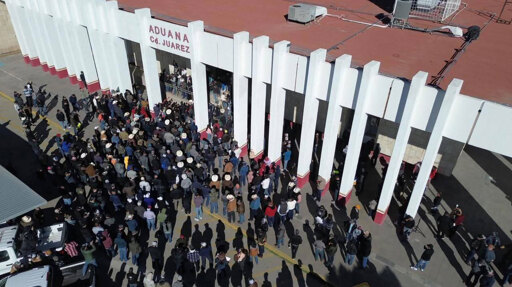This article by Salvador Miranda originally appeared in the November 24, 2025 edition of El Sol de México.
Editor’s note: Predictably, the recent farmers actions in Mexico originate from ideologically diverse quarters, from the remnants of the old, PRI-dominated campesino organizations to more left-wing organizations, but the primary demands have remained consistent and progressive: to secure food sovereignty, particulary in basic grains, in a country which has experienced massive dumping from the United States for decades, since the origin of the “free trade” agreements. There’s no more stark example of the disaster facing the Mexican field than corn. The dilemma is expertly described in this article by Timothy A. Wise. Mexico, which is almost entirely sovereign in corn production and known as the home of corn, is flooded with white corn from the United States, heavily-subsidized to the tune of over $5 billion USD annually and supported by a variety of programs and supports from governments at all three levels in the United States.
Farmers and agricultural producers from different regions of the state of Chihuahua began to gather this morning in the vicinity of the flagpoles located at the entrance to Ciudad Juárez, next to the Córdova-Américas international bridge, to begin a series of protests against the agricultural policy of the Federal Government.
The protesters claim that recent decisions are jeopardizing the viability of Mexican agriculture and demand an immediate change in the national marketing model.
Eraclio Rodríguez, leader of the National Front for the Development of the Mexican Countryside, explained that this mobilization is part of a national protest that is being replicated today in various states.
He pointed out that peasant organizations are demanding a sovereign agricultural scheme, capable of leaving behind dependence on the Chicago Stock Exchange, which he described as “a totally speculative market”.

According to Rodríguez, the Federal Government intends to buy from national producers at prices well below their real costs, based on the quotations of said international exchange.
He asserted that this practice allows grains to be acquired at half their production value, and then sold to Mexican consumers at high prices, impacting products such as tortillas, milk, and beans.
The leader highlighted that beans are one of the clearest examples: while farmers are paid around 12 pesos per kilo, in supermarkets they can be sold for up to 30 pesos or more. This gap, he stated, keeps producers in a critical situation and favors the concentration of the market in the hands of intermediaries and large marketing companies.
Outside the Ciudad Juárez Border Customs office, more than one hundred farmers from Janos, Ascensión, El Porvenir, Samalayuca, Buenaventura and other agricultural communities in the region have already been counted.
With blankets draped in their clothing, the farmers remain in the area while they decide on the next steps in their protest. Raquel Rodríguez announced that in the coming hours they plan to symbolically occupy the border crossing and allow free passage to motorists crossing from El Paso, Texas, into Ciudad Juárez.
He stated that the mobilization will be peaceful, but visible enough for the Federal Government to recognize the magnitude of the discontent.

On the other hand, Eraclio Rodríguez responded to the call issued by the Ministry of the Interior, stating that it is not a “respectful” invitation to dialogue. According to the leader, the Government has not shown a real willingness to recognize peasant organizations and, without such recognition —he asserted—, there can be no genuine dialogue or a fundamental solution to the conflict.
Fidel Méndez, president of the Local Plant Health Board of the Juárez Valley, also joined the protest, warning that the new National Water Law represents an additional threat to the sector.
He argued that the regulations would allow the withdrawal of concession titles “at discretion,” which would deepen the crisis in the agricultural sector.
The protesters announced that they will remain at the international crossing between Ciudad Juárez and El Paso, Texas, until the Federal Government opens a formal dialogue, recognizes the demands of the agricultural sector, and commits to reviewing the policies that—they claim—are putting national production at risk.

Mexican Farmers Occupy US Border Crossing, Protesting Agricultural Policy
November 24, 2025November 24, 2025
Campesinos are demanding the federal government craft a sovereign agricultural scheme & leave the speculative market of the Chicago Stock Exchange, which forces prices well below production value.
Supreme Court Re-Opens Coca Cola Tax Debt
November 24, 2025November 24, 2025
For decades, a neoliberal-captured Supreme Court allowed corporations to evade and defer massive tax debts to the Mexican state. Recent rulings suggest that era may be over.
Xiomara Castro, President of Honduras, Arrives in Mexico
November 24, 2025November 24, 2025
Honduras is currently experiencing what the Progressive International has called “a coordinated effort to distort, delegitimize, and ultimately interfere in the country’s sovereign democratic process.”
The post Mexican Farmers Occupy US Border Crossing, Protesting Agricultural Policy appeared first on Mexico Solidarity Media.
From Mexico Solidarity Media via this RSS feed





